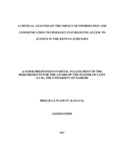| dc.description.abstract | Justice is defined in various ways, namely, social, legal, administrative or judicial justice. Access
to justice is therefore determined by these definitions given to the term ‘justice’.
Judicial justice relates to the commissions and omissions of the judiciary in a jurisdiction, which
either inhibit or enhance the access to justice. This is because the judiciary is the main arbiter of
conflicts between the state and individuals and the individuals inter se. It therefore has the
responsibility to protect the rights of the people and the Rule of Law.
The Kenyan Judiciary has in the past been accused of failing to uphold and enforce the principles
of the Rule of Law as a result of which many lost confidence in it.
The Kenyan Judiciary has undertaken reforms to ensure that it is able to effectively and
efficiently carry out its constitutional mandate. One of the main reforms is the introduction of the
use of ICT in the operations of the Judiciary. This has been done through the use of ipads, video-
conferencing techniques, electronic filing and internet usage among many others. All these were
aimed at making the access to justice a reality to millions of Kenyans who visit the court
corridors seeking redress.
This paper is a critical analysis of the impact of the use of ICT in the Judiciary in so far as
enhanced access to justice is concerned | en_US |

